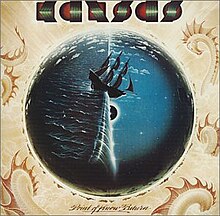Point of Know Return
| Point of Know Return | ||||
|---|---|---|---|---|
 |
||||
| Studio album by Kansas | ||||
| Released | October 11, 1977 | |||
| Recorded | June–July 1977 at Woodland Sound, Nashville, Tennessee and Studio in the Country, Bogalusa, Louisiana | |||
| Genre | Progressive rock | |||
| Length | 44:24 | |||
| Label |
Kirshner Legacy/Epic |
|||
| Producer | Jeff Glixman | |||
| Kansas chronology | ||||
|
||||
| Singles from Point of Know Return | ||||
|
||||
| Professional ratings | |
|---|---|
| Review scores | |
| Source | Rating |
| AllMusic | |
Point of Know Return is the fifth studio album by American rock band Kansas, released in 1977. The album was reissued in remastered format on CD in 2002, and reissued as Playlist: Cool Songs.
Singer/songwriter Steve Walsh left the group briefly. He would admit that, at this point, he had been something of a prima donna in an interview with nationally syndicated radio host Redbeard on the weekly rockumentary series In the Studio with Redbeard (edition #849, week of September 27, 2004 and again on the 30th Anniversary Episode for Point of Know Return in 2007).
The album is criticized for singles like "Point of Know Return". "Point of Know Return" was a later addition to the album. "Portrait (He Knew)" was written about Albert Einstein. In 1988, Livgren released an updated version of "Portrait (He Knew)" titled "Portrait II" as part of the album Prime Mover credited to his band AD. He changed the subject of the song from Einstein to Jesus Christ. "Closet Chronicles" is a Howard Hughes allegory.
"Dust in the Wind" is known for its sparse acoustic nature. The guitar line for the song was written by Kerry Livgren as a finger exercise for learning fingerpicking. His wife, Vicci, heard what he was doing, remarked that the melody was nice, and encouraged him to write lyrics for it. Livgren was unsure whether his fellow band members would like it, since it was a departure from their signature style. However he did offer it to them, and the song was accepted and then recorded.
Rolling Stone gave the album a mixed review, saying that though the transition to shorter songs generally works, the lyrics are "a wan and ridiculous rehash of the bargain-basement exoticism employed by the British art-rock crowd." They commented that though the band lacks a virtuoso soloist, the band's ensemble playing is strong and purposeful.
...
Wikipedia
